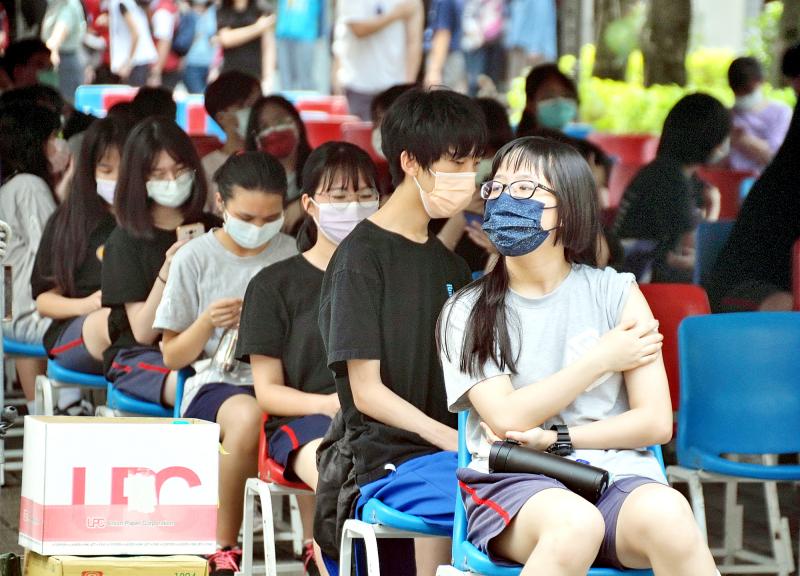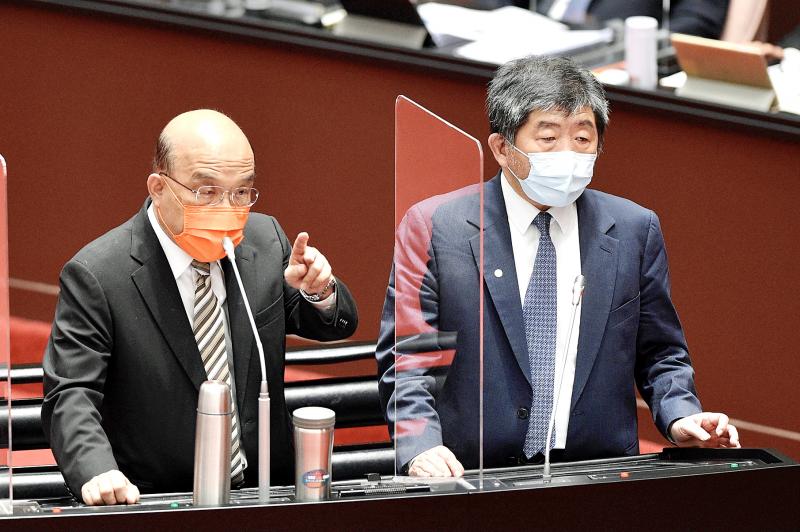Taiwan is expected to have 70 percent first-dose vaccination coverage by the end of next month, Premier Su Tseng-chang (蘇貞昌) told a question-and-answer session at the Legislative Yuan in Taipei yesterday, touting the nation’s response to COVID-19 as the envy of many countries.
Answering legislators’ questions, Su said that with good cooperation between the central and local governments, Taiwan is expected to have a first-dose vaccination rate of 60 percent by beginning of next month and a rate of about 70 percent by the end of the month.
“In four months, Taiwan has made great progress, from less than 1 percent first-dose coverage in May to about 50 percent currently. Right now, 11.6 million people in Taiwan have received their first shot,” he added.

Photo: CNA
Taiwan places near the top of Bloomberg News’ monthly COVID Resilience Ranking of major economies that have best fought the pandemic, Su said.
“We are among the leaders in the latest ranking, and many countries around the world are envious of us for getting the pandemic under good control,” he added.
Asked about the government’s delayed vaccine procurement, Su said: “Early on, Taiwan had a stable COVID-19 situation, without many cases, so most people were unwilling to get vaccinated.”

Photo: George Tsorng, Taipei Times
Chinese Nationalist Party (KMT) Chairman and Legislator Johnny Chiang (江啟臣) told Su: “If we cannot reach 70 percent coverage by the end of the year and have not procured more vaccines, you should resign.”
Chiang criticized the government’s vaccine procurement for a lack of transparency, but Su said that the sourcing is being worked on at all levels of the government.
Other lawmakers questioned Minister of Health and Welfare Chen Shih-chung (陳時中) about the procurement process.
“We have a time table, but it is better not to publicize it,” Chen said, adding that the number of doses continually changes and countries would fight over the amounts if such details were announced.
“This is why manufacturers have requested for us not to divulge such information... The delivery schedule is kept under wraps for the same reason,” Chen said.
Yesterday, American Institute in Taiwan (AIT) spokesman Ed Dunn said the White House announced on Monday that from early November, all foreigners traveling to the US must show proof that they are fully vaccinated.
Asked about a US Presidential Proclamation allowing travelers from certain areas to enter the US with a National Interest Exception, Dunn said that the proclamation is to end in early November.
All foreign adults must be fully vaccinated before boarding a plane to the US, Dunn added.
Deputy Minister of the Interior Chen Tsung-yen (陳宗彥) said that Taiwan would keep in close touch with the AIT and the Taipei Economic and Cultural Representative Office in the US to understand how the policy is to be implemented.
Additional reporting by Lee I-chia

The Central Election Commission has amended election and recall regulations to require elected office candidates to provide proof that they have no Chinese citizenship, a Cabinet report said. The commission on Oct. 29 last year revised the Measures for the Permission of Family-based Residence, Long-term Residence and Settlement of People from the Mainland Area in the Taiwan Area (大陸地區人民在台灣地區依親居留長期居留或定居許可辦法), the Executive Yuan said in a report it submitted to the legislature for review. The revision requires Chinese citizens applying for permanent residency to submit notarial documents showing that they have lost their Chinese household record and have renounced — or have never

A magnitude 5.6 earthquake struck off the coast of Yilan County at 12:37pm today, with clear shaking felt across much of northern Taiwan. There were no immediate reports of damage. The epicenter of the quake was 16.9km east-southeast of Yilan County Hall offshore at a depth of 66.8km, Central Weather Administration (CWA) data showed. The maximum intensity registered at a 4 in Yilan County’s Nanao Township (南澳) on Taiwan’s seven-tier scale. Other parts of Yilan, as well as certain areas of Hualien County, Taipei, New Taipei City, Taoyuan, Hsinchu County, Taichung and Miaoli County, recorded intensities of 3. Residents of Yilan County and Taipei received

Taiwan has secured another breakthrough in fruit exports, with jujubes, dragon fruit and lychees approved for shipment to the EU, the Ministry of Agriculture said yesterday. The Animal and Plant Health Inspection Agency on Thursday received formal notification of the approval from the EU, the ministry said, adding that the decision was expected to expand Taiwanese fruit producers’ access to high-end European markets. Taiwan exported 126 tonnes of lychees last year, valued at US$1.48 million, with Japan accounting for 102 tonnes. Other export destinations included New Zealand, Hong Kong, the US and Australia, ministry data showed. Jujube exports totaled 103 tonnes, valued at

BIG SPENDERS: Foreign investors bought the most Taiwan equities since 2005, signaling confidence that an AI boom would continue to benefit chipmakers Taiwan Semiconductor Manufacturing Co’s (TSMC, 台積電) market capitalization swelled to US$2 trillion for the first time following a 4.25 percent rally in its American depositary receipts (ADR) overnight, putting the world’s biggest contract chipmaker sixth on the list of the world’s biggest companies by market capitalization, just behind Amazon.com Inc. The site CompaniesMarketcap.com ranked TSMC ahead of Saudi Aramco and Meta Platforms Inc. The Taiwanese company’s ADRs on Tuesday surged to US$385.75 on the New York Stock Exchange, as strong demand for artificial intelligence (AI) applications led to chip supply constraints and boost revenue growth to record-breaking levels. Each TSMC ADR represents